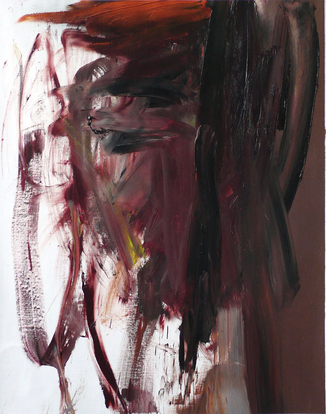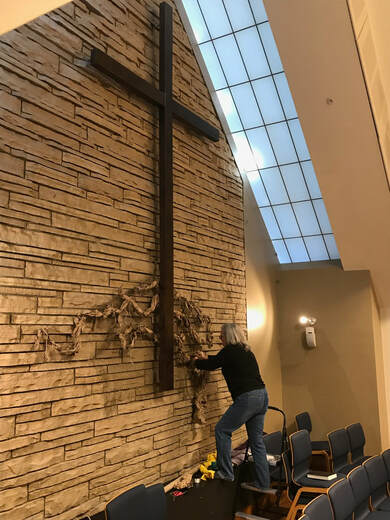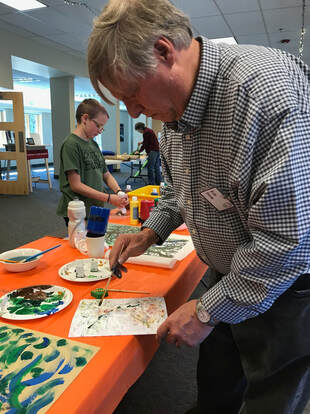|
Our Mother, this Lent we journey in the desert with you again
to remember our story of faith, and our connection to each other. We are a joyful people, grateful for family, for opportunities to serve each other, for Spring coming again. But we are also an anxious people, a fearful people, a grieving people. We are thirsty. We are hungry. We need your water, waters of healing and comfort, waters of hope, waters of welcome. We need your fruit, fruit of commitment, fruit of determination, fruit of inspiration. We pray for people waiting in actual deserts, deserts of water in the Midwest flooding, and deserts of sand. Searching for a new home, grieving the homes they were forced to leave behind, praying for a new community to welcome them. Help us to remember Jesus' ministry as bringing together all people, calling us to sit together at the same table and be One Human Family. May we live into that vision he gave us by saying together the prayer that Jesus taught us: The Lord’s Prayer...  A visual depiction of Bach's Harpsichord Concerto in D Minor, BWV 1052 by Tamás Kopasz (2009) Source: Tkopasz (Wikimedia Commons) A visual depiction of Bach's Harpsichord Concerto in D Minor, BWV 1052 by Tamás Kopasz (2009) Source: Tkopasz (Wikimedia Commons) As an organist, the spring equinox inevitably brings up J.S. Bach, who was born on March 21, 1685. To celebrate, I took to the console and binged on Bach's organ works for about an hour last Thursday. Afterwards, I thought, what is it that makes this music so wonderful, grand, and powerful? One can always point to his masterful contrapuntal writing (considered never surpassed by music scholars), but to me it's much more. It's the intent. Two quotes from Bach sum it up well: “I have always kept one end in view, namely ... to conduct a well-regulated church music to the honor of God.” and “The aim and final end of all music should be none other than the glory of God and the refreshment of the soul.” The Doctrine of the Affects was a popular theory of aesthetics in music during Bach's life. Based on ancient principles of rhetoric and oratory, the composer sought to embody concepts such as joy, sadness, or sorrow into their music through the outward constructs of notes and rhythm. Bach's intent of channeling the divine through his music then was given a viable path to our ears. For myself, playing Bach is always an experience where new ideas for interpretation happen each time I revisit a work of his. And I look forward to those opportunities in the new works I undertake. It is because he has given us all so much to decipher in the notes and rhythms themselves, waiting to be discovered and released. But now on to you, the listener. While music is no doubt subjective, there is a remarkable amount of consistency in our reactions to most music. This Lent I have offered music that is slightly more introspective during this penitential season. Perhaps no one has consciously noticed, but it is true. The big reed stops during the postlude have taken a leave of absence and the choir anthems include more serene and sublime selections, such as the Maurice Duruflé Kyrie on Lent I. All of these approaches signify a new affect in Lent, one that will be soon replaced with the joy and ecstasy of Easter. Music is a potent and reliable partner in our journey through the liturgical year. Bach and generations of church musicians after have understood this but it is nothing if it is not shared with those who wish to listen. Soli Deo Gloria. Mark Heiskanen Director of Music/Organist AuthorMark Heiskanen has been Plymouth's Director of Music since September 2017. Originally from Northeast Ohio, Mark has experience and great interest in a diverse range of musical styles including jazz, rock, musical theatre, and gospel. He is thrilled to serve a congregation and staff that values diversity and inclusion in all facets of life. Read his mostly-weekly Music Minute here. Oscar Wilde wrote in an 1889 essay that, “Life imitates Art far more than Art imitates Life.” This famous quote speaks directly to a very active topic in the church world about the boundaries of Sacred Culture and Popular Culture. What is appropriate for worship or to be used as devotional material in the Church? Do the materials or music need to have Sacred Intention at the time of creation or is borrowing from one to the other okay? I want us to reflect on this and to offer a practical devotional practice this Lent to help us Go Deeper whenever a popular song on the radio or so called “secular” NPR story pulls at the Sacred parts of our Souls. First, let’s start with definitions. What is popular culture? Somehow, I still have all my textbooks from a class I took twelve years ago at Grinnell College called, “Nineteenth Century American Popular Culture!” In the book, Cultural Theory and Popular Culture, expert sociologists tell us, “culture [is] one of the two or three most complicated words in the English language…First, culture can be used to refer to a general process of intellectual, spiritual, and aesthetic development…A second use of the word culture might be to suggest a particular way of life, whether of a people, a period or group…Finally, culture can be used to refer to the works and practices of intellectual and especially artistic activity. In other words, culture here means the texts and practices whose principle function is to signify, to produce or to be the occasion for the production of meaning. Culture in this third definition is synonymous with what structuralists and post-structuralists call ‘signifying practices.’” The Church has traditionally liked to think of itself as part of the cohort of institutions protecting and operating within the first definition of culture—that of the academy and synonymous with high culture and authority. That is an unfortunate category for us to place ourselves. We should be the movement-makers. I would argue that we really need to be intentionally in the business and the artistic process of creating and aligning with Popular Culture—the third and more intimate definition with daily, lived, deep, embodied, real Christian living and practice. How are we still producing meaning? How are we working to be relevant and interesting to those whom have never thought Church was an option? How can we find God in the Secular and then make it Sacred? Church is in the business of Signifying Practices that make life and living better, more whole, and deeper! Even as a Mainline Minister, the greatest gift of growing-up Evangelical Christian that I cling to and still believe from the depths of my heart and lived experience is a lack of boundary between the Sacred and Secular parts of life. God is working in and through everything. “Prepare my heart,” O God, we pray, “and may I find you in every way.” This doesn’t mean that they like “the world,”, but it means that they use and incorporate popular culture into the church in order to transform it into church culture. My favorite “hymn” growing-up was, and this is not a joke, “I’m a Believer” by the Monkees. It was modified, of course, from the original love song to be about God. As Progressive Mainliners, we have amazing worship together on Sundays, and I do not suggest changing the authenticity of who we are and our tradition with that part of who we are and what we do here. If anything, it makes us cool and appealing to new generations that we have tradition and liturgy. Our worship is awesome and unique. We should, however, go deeper and find God in the popular culture songs that move our souls and hearts. An example, for me, is a song that has been on the radio recently and on the Charts called, “You’re Someone Else,” by the group Flora Cash. Here is the Practice of Transforming Popular Culture into Personal Faith Culture and it is radical: The lyrics speak to a sense of connection between people, seeing the beauty in others that they don’t always see themselves, and the need for authenticity in a time of superficiality. Songs like these have the power to save lives, to give hope, and to help people go deeper. If we listen with intention to popular culture songs, spend time meditating on the lyrics, and praying for those whom are most effected around the world by the music, the act of passively listening to music can become Spiritual Practice. Now, that is radical. (Here is the original video (art) produced by the band.) I saw the part of you That only when you're older you will see too You will see too I held the better cards But every stroke of luck has got a bleed through It's got a bleed through You held the balance of the time That only blindly I could read you But I could read you It's like you told me Go forward slowly It's not a race to the end Well you look like yourself But you're somebody else Only it ain't on the surface Well you talk like yourself No, I hear someone else though Now you're making me nervous You were the better part Of every bit of beating heart that I had Whatever I had I finally sat alone Pitch black flesh and bone Couldn't believe that you were gone Well you look like yourself But you're somebody else Only it ain't on the surface Well you talk like yourself No, I hear someone else though Now you're making me nervous Well you look like yourself But you're somebody else Only it ain't on the surface Well you talk like yourself No, I hear someone else though Now you're making me nervous Where are we? Where are we? Well you look like yourself But you're somebody else Only it ain't on the surface Well you talk like yourself No, I hear someone else though Now you're making me nervous Well you look like yourself But you're somebody else Only it ain't on the surface Well you talk like yourself No, I hear someone else though Now you're making me nervous I saw the part of you that only when you're older You will see too, you will see too What do you hear resonate with you? Loneliness, hope, potential, loss, isolation, liberation, God? Where is God working through this music or lyrics? Have you ever tried to be someone else? How did that go for you? How were you transformed? Are you still trying to be someone else—a hero, a villain, a parent, a celebrity? All of us have time to listen to the radio or NPR. Music is all around us now with Spotify and Pandora. Let’s turn it into a Spiritual Practice. At the end of a song, a segment, a story you hear pray for yourself or for someone else out there also listening to it or implicated in it. Pray for the hope to go on and to live in authenticity. Journal based on a favorite song. Draw a picture of how you feel. Turn the ordinary into the deeply extraordinary. This is the future of Christianity—we must again be in the camp of the signifying practices and cultural totems that really mean and feel and sing something to diverse people. “Well you look like yourself, but you are someone else… only it ain’t on the surface.” Let’s find ways to get beyond the surface of things together as a community of faith and go deeper again. In Authenticity Always, Jake AuthorThe Rev. Jake Miles Joseph ("just Jake"), Associate Minister, came to Plymouth in 2014 having served in the national setting of the UCC on the board of Justice & Witness Ministries, the Coalition for LGBT Concerns, and the Chairperson of the Council for Youth and Young Adult Ministries (CYYAM). Jake has a passion for ecumenical work and has worked in a wide variety of churches and traditions. Read more about him on our staff page.  If you were at Plymouth last weekend, you saw some different-looking things in our sanctuary: a root-structure art installation along the rear wall and tree roots emerging from the base of the cross above the chancel. These and other pieces were produced by your fellow Plymouth members (even me!) during the Lenten arts retreat led by our visiting theologian/artist, the Rev. Linda Privatera. (Kudos to my colleague, Jane Anne, for orchestrating the whole weekend!) All of this art was a theological reflection on our 2019 congregational theme: Go Deeper. All of us are rooted in the soil of Christian spirituality, but to get down into the richest nutrients and the aquifers of the Spirit, we need to go deeper in our faith. And Lent is a great time to do that! Many of us in the Protestant traditions of the Christian household are less familiar with spiritual practices beyond daily Bible reading that will help us to go deeper in our sense of God’s presence in our lives. What’s more, we often don’t know where to turn. And even though I often hear from our members that they want deeper spiritual lives, we are seldom overrun by crowds when we offer spirituality workshops and retreats.  Want to try it out on your own? That’s certainly a place to start during Lent. One entry point is the UCC Lenten Devotional that our deacons are offering to you each Sunday…it’s available between services with a suggested donation of $5…but if you don’t have the five bucks, don’t sweat it! Sometimes, I wonder if, as Anthony de Mello suggests, “People would rather have a definition than an experience.” However, definitions won’t help us go deeper in our faith. Another resource for you to read (and most people at Plymouth love to read!) is from UCC author and clergywoman Jane Vennard, who formerly taught at the Iliff School of Theology (and she was my spiritual director, too!). Fully Awake and Truly Alive: Spiritual Practices to Nurture Your Soul is a fantastic volume that will help you explore spiritual practices that will allow you to go deeper. Maybe you want to dip your toe into Centering Prayer at Plymouth (Mondays, noon – 1:30 or Tuesdays, 5:30 – 6:30)…it’s a great way to enter the quiet center! Or drop by our outdoor Labyrinth and walk anytime it’s not covered with snow! Whatever your spiritual practice this Lent, I hope that it deepens your relationship with the Holy One, who is there to meet you, befriend you, and guide you. Lenten blessings! P.S. Dinner Church was a great success! Join us for our next Dinner Church at 6:00 p.m. on Sunday, April 7 (for ham, scalloped potatoes, veggie shepherd’s pie, and great discussion and worship).
Dear Plymouth, I did not grow up with the tradition of Lent. I came to it when I moved into the United Church of Christ in the 1980s. Since then I have learned layers of meaning for the season and traditions of Lent. Lent – derived from the Old English word meaning “spring season” and the Old German word meaning “lengthening of days. Lent – a penitential season of 40 days in the Christian liturgical calendar; in the 2nd, 3rd and 4th century church, a time of final examination and catechesis for those wishing to join the faith at the Easter Vigil. Lent – a time of fasting, study and penitence; also a season to explore new avenues of prayer. Lent – a faith journey from Ash Wednesday to Holy Thursday; a time to travel wilderness paths of spiritual reflection; a time to go deeper putting our faith roots down into the soil of God’s love. Lent – a time .... To pray you open your whole self To sky, to earth, to sun, to moon To one whole voice that is you. And know there is more That you can’t see, can’t hear; Can’t know except in moments Steadily growing, and in languages That aren’t always sound but other Circles of motion. ... From “Eagle Poem” by Joy Harjo The proverbial Lenten journey is what we make of it each year. It can be a time to add a spiritual discipline to your life in a search for spiritual renewal. It can be a time to abstain from an activity in order to have more time for just Being. It can be a preparation time for the new life of spring, a time to plant seeds literally and metaphorically. A time to till the earth, spread compost and start the garden as a spiritual action. It’s a time for listening in new ways to our souls, to God’s wisdom that lives within us as well as in scripture and tradition. I invite you to plunge into Lent this year through Plymouth’s worship services, through spiritual growth classes and retreats, through deepening relationships in Christian fellowship. Check out:
Above all this Lent find a way to call your spirit back from aimless wandering. Call your spirit to an intentional journey following Jesus the pioneer and model of our faith in God. ... Turn off that cellphone, computer, and remote control. Open the door, then close it behind you. Take a breath offered by friendly winds. ... Give it back with gratitude. ... Call your spirit back. It may be caught in corners and creases of shame, judgment, and human abuse. You must call in a way that your spirit will want to return. Speak to it as you would to a beloved child. Welcome your spirit back from its wandering. ... From “Calling Your Spirit Back From Wandering the Earth in Human Feet” by Joy Harjo With you all on the journey, Jane Anne AuthorThe Rev. Jane Anne Ferguson, Associate, Minister, is a writer, storyteller, and contributor to Feasting on the Word, a popular biblical commentary. She is also the writer of sermon-stories.com, a lectionary-based story-commentary series. Learn more about Jane Ann here. |
Details
|




 RSS Feed
RSS Feed